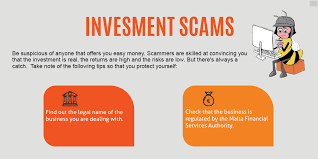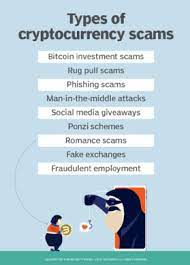Investment Scams: How to Spot and Avoid Them
As an investor, you want to make intelligent decisions with your money. Unfortunately, some seek to take advantage of others through investment scams. Unfortunately, these fraudulent schemes can be hard to spot, especially for those new to investing. In this article, we’ll explore the different types of investment scams, how to spot them, and what you can do to protect yourself.
What are Investment Scams?
Investment scams are fraudulent schemes that promise high returns on investment and low risk but result in financial losses instead. These scams come in many forms, including Ponzi, pyramid, and advance-fee scams. The scammers use a variety of tactics to lure in investors, such as text messages promising quick and easy profits or claiming to have insider investment information.
Types of Investment Scams
Ponzi schemes – A Ponzi scheme is a fraudulent investment scheme where returns are paid to earlier investors using the capital of newer investors. These scams typically collapse when the number transfer money of new investors dries up, and the scheme can no longer pay out the returns promised to earlier investors.
Pyramid schemes – Pyramid schemes involve recruiting new investors who pay an upfront fee to join. The new investors are encouraged to give money to recruit even more, promising high returns for each person whose money they bring in. This scheme continues until no new investors are any money left to pay people to recruit or lure investors, and those at the bottom of the pyramid are left with nothing.
Advance-fee scams – An advance-fee scam involves an investment fraudster the scammer promising the investor a quick money significant return on their investment in exchange for an upfront fee. Once the payment is paid, the scammers claim huge profits, and the investor never again sends money or hears from the scammer.
How to Spot Investment Scams
There are several red flags to watch out for regarding investment scams. Here are more tips and a few things to keep in mind:
- High returns with little or no risk – If an investment promises high returns with little or no risk, it’s likely too good to be true. All investments come with some risk, and anyone promising otherwise is likely trying to scam you.
- Pressure to act quickly – Scammers often pressure investors to act quickly, using fear of missing out or other tactics to make them feel like they need to work immediately. Don’t let yourself be rushed into investing without doing your due diligence.
- Unsolicited offers – Be wary of unsolicited offers, especially those that come over the phone or through email. Scammers often use these methods to reach out to potential victims.
- Lack of information – Legitimate investment opportunities should contain plenty of information about the company, the investment, and the risks involved. If you’re not given this information, it’s a red flag.
Protecting Yourself from Investment Scams
The best way to avoid investment scams and protect yourself from investment scams is to research. Here are a few tips to keep good investment in mind:
- Check the SEC database – The Securities and Exchange Commission maintains a registered investment companies and individuals database. Ensure the company or individual you’re considering investing with is registered.
- Verify information – Do your due diligence and verify any information you’re given about an opportunity. For example, check the company’s financial statements, talk to other investors, and consult a financial advisor if unsure.
- Don’t invest more than you can afford to lose – Never invest more than you can afford to lose. Only invest money you’re willing and able to part with if the investment doesn’t pan out.
- Be wary of online ads – Online ads can be a breeding ground for investment scams. So be careful of ads promising high returns with little or no risk.
In conclusion, investment fraud and scams are a real threat to investors. By being aware of the different types of investment fraud and scams and knowing how to spot them, you can protect yourself from falling victim to people who lose millions due to these fraudulent schemes. Remember always to do your due diligence before making any investment product or investment decisions, and never invest more than you can afford not to lose money again.
If you suspect you’ve been the victim of an investment scam, immediately contact the Securities and Exchange Commission or your local law enforcement agency. The sooner you take action, the better your chances of recovering your funds, avoiding fraud, and preventing others from being scammed.

Investment Scams: How to Protect Yourself
As an investor, you constantly seek opportunities to grow your wealth. However, with the rise of investment scams on social media, it is essential to know the warning signs and how to protect real investments, yourself, and mutual funds from these fraudulent schemes.
This article will provide comprehensive information on common investment scams and how to spot them. We will cover different types of investment scams, common tactics used by scammers, and steps you can take to protect yourself from falling victim to these scams.
Types of Investment Scams
Investment scams come in many forms and can be challenging to detect. However, several types of scams are commonly used by fraudsters to trick investors into parting with their money. Some of the most common types of investment scams include:
- Ponzi schemes: A Ponzi scheme is a fraudulent investment scheme in which returns are paid to earlier investors using the capital contributed by newer investors. Ponzi schemes rely on continuously recruiting new investors to generate returns for earlier investors.
- Pyramid schemes: A pyramid scheme is a fraudulent investment scheme in which participants are promised high returns for recruiting new members. Pyramid schemes are unsustainable and often collapse when there are no more new members to recruit.
- Pump and dump schemes: A pump and dump scheme is a fraudulent investment scheme in which scammers artificially promote a stock to inflate its price. Once the price reaches a certain level, the scammers sell their shares, causing the price to plummet and leaving other investors with losses.
- Advance fee scams: An advance-fee scam is a fraudulent investment scheme in which scammers ask investors to pay an upfront fee in exchange for access to an investment opportunity that does not exist.
- Forex trading scams: Forex trading scams involve scammers who claim to be able to predict market movements and promise high returns to investors who invest in their trading schemes.

Common Tactics Used by Scammers
Investment scammers often use standard tactics to trick investors into using false and misleading statements about financial products before parting with their money. Some of the most common tactics used by scammers include:
- Pressure to act quickly: Scammers often pressure investors to act promptly and make a decision before they have had time to think through the investment opportunity.
- Promises of high returns: Scammers often promise investors high returns that are too good to be valid to lure them into investing.
- Claims of insider knowledge: Scammers often claim insider knowledge about the market or the investment opportunity they are promoting to make themselves appear credible.
- Unsolicited calls or emails: Scammers often use unsolicited calls or emails to reach out to potential victims.
Steps to Protect Yourself
Protecting yourself from investment scams requires diligence, investor education, and a healthy dose of skepticism. However, here are some steps you can take to protect yourself:
- Do your research: Always do your research before investing in any opportunity. Check if the chance is registered with the Securities and Exchange Commission (SEC) or your local securities regulator.
- Beware of high-pressure sales tactics: Be wary of any investment opportunity that requires you to act quickly. Instead, take your time to review the chance and do your due diligence.
- Don’t believe promises of high returns: If an investment opportunity promises high returns that seem too good to be true, it probably is.
- Never invest more than you can afford to lose: Never invest more than you can afford to lose. Keep your investments diversified and spread out across different asset classes.
- Report suspected scams: If you suspect you have been the victim of an investment scam, report it to the SEC or your local law enforcement agency immediately.

Another critical step in protecting yourself from investment scams is to do your due diligence and research any potential investments thoroughly. This means looking into contact details of the company’s stock, name, or individual offering the investment, checking their credentials, disciplinary history, and track record, and examining the details of the asset itself.
It’s also important to be aware of common red flags on social media that may indicate a scam, such as promises of guaranteed returns, unsolicited investment offers, unsolicited approaches, or claims of insider knowledge or special access. In addition, scammers often use their social media accounts to prey on the emotions of their targets, using fear or greed to manipulate them into making rash investment decisions. By remaining calm, rational, and skeptical of social media, however, you can avoid falling victim to these tactics.
If you become the victim of an investment scam, it’s essential to take action quickly. First, contact your financial institution to freeze your accounts and report the fraud to the appropriate authorities, such as the SEC or local law enforcement agency. You may also want to consider seeking the assistance of a reputable financial advisor or legal professional to help you recover your losses.
In summary, investment scams seriously threaten investors of all experience levels and financial status. However, by staying vigilant, researching investment opportunities, investing wisely, and being aware of common warning signs, you can protect yourself from these fraudulent schemes. Remember, if an investment opportunity seems too good to be true, it probably is.

Conclusion
Investment scams are on the rise and can be challenging to detect. However, taking the necessary precautions can protect you from these fraudulent schemes. Continuously research, be skeptical of high-pressure sales tactics, and never invest any more money than you can afford to lose. Remember, if an investment opportunity seems too good to be true, it probably is. By being aware of the warning signs of real estate investment scams and taking the necessary steps to protect yourself, you can invest your money confidently and avoid becoming a victim of real estate investment seminars and other investment fraud.
CoopBusiness is a revolutionary cooperative business-building platform that empowers individuals to become entrepreneurs, business owners, and financially independent.
As a member, you’ll receive top-level business mentorship, access to our proprietary business systems, and the opportunity to access the funds you want to turn your business ideas into reality.